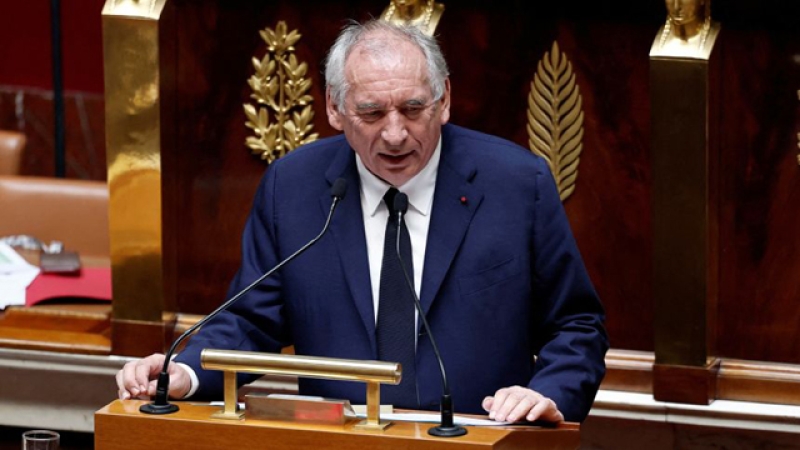- Bangladesh 2024, Nepal 2025: Youth Movements Force Leaders Out |
- Nepal PM resigns as 19 killed in social media ban, graft protests |
- Western Support for Israel Faces Growing Strains |
- Nepal lifts social media ban after 19 killed in protests |
- DU VC vows maximum transparency in Tuesday's DUCSU elections |
French PM Bayrou Ousted in Shock Parliament Vote

French Prime Minister François Bayrou (File photo)
France’s parliament on Monday toppled the government of Prime Minister François Bayrou after just nine months in office, plunging President Emmanuel Macron into a new political crisis and forcing him to find a successor within days.
Bayrou stunned even his allies by calling a confidence vote to break a long-running deadlock over his austerity budget, which proposed nearly €44 billion ($52 billion) in cost savings to tackle France’s towering debt. The gamble backfired dramatically.
In a decisive outcome, 364 deputies voted against Bayrou’s government while only 194 expressed confidence. National Assembly Speaker Yaël Braun-Pivet declared that, in line with Article 50 of the French Constitution, the prime minister must tender his government’s resignation.
Bayrou thus became the first premier in modern French history to be ousted through a failed confidence vote rather than a no-confidence motion.
The Élysée Palace quickly confirmed that President Macron had “taken note” of the outcome and would appoint a new premier “in the coming days,” dismissing any lingering speculation that he might instead call snap elections. Macron is due to meet Bayrou on Tuesday to formally accept his resignation.
Bayrou is the sixth prime minister to serve under Macron since his election in 2017, and the fifth since 2022. His removal comes as Macron juggles a turbulent domestic landscape with his efforts to spearhead diplomatic initiatives abroad, particularly over Russia’s war in Ukraine.
Defending his risky move, Bayrou told lawmakers: “The biggest risk was not to take one, to let things continue without anything changing, and have business as usual.” He warned that France’s debt pile was “life-threatening” and insisted his plan was the only path to escaping “the inexorable tide of debt that is submerging” the nation.
Macron’s dilemma
The president now faces one of the most delicate decisions of his mandate: choosing a seventh prime minister capable of navigating a fractured parliament.
The Socialist Party (PS), led by Olivier Faure, has already expressed readiness to govern. “I think it’s time for the left to govern this country again and make sure we can break with the policies of the last eight years,” Faure told TF1 television. But questions remain over whether such a government could survive a confidence test.
On the right, heavyweight ministers such as Justice Minister Gérald Darmanin enjoy Macron’s trust, but their appointment risks triggering left-wing opposition. Lower-profile figures like Health Minister Catherine Vautrin or Finance Minister Eric Lombard are also being floated as consensus options.
A poll by Odoxa-Backbone for Le Figaro found that 64 percent of the French want Macron himself to resign rather than appoint another prime minister, though the president has ruled that out. Constitutionally, he is barred from seeking a third term in 2027.
Unrest on the horizon
The political turbulence comes as France braces for fresh social tensions. A left-wing collective, “Block Everything,” has called for nationwide action on Wednesday, while trade unions are preparing strikes on September 18.
The horizon is further complicated by the looming 2027 presidential election, where analysts predict the far-right could mount its strongest-ever challenge.
Marine Le Pen, three-time presidential candidate for the National Rally (RN), suffered a major setback earlier this year when she was convicted over a European Parliament fake jobs scandal. Sentenced to four years in prison, two of them suspended, and banned from running for office for five years, her political career appeared in jeopardy.
However, a Paris court announced Monday that her appeal will be heard from 13 January to 12 February 2026 — well before the election — potentially reviving her presidential ambitions if the ruling is overturned.
Buoyed by the news, Le Pen, cheered by RN MPs, demanded that Macron call snap legislative elections. “Holding the polls is not an option but an obligation,” she declared.
For Macron, the rejection of Bayrou’s government marks a new chapter of instability at home just as France confronts both mounting economic challenges and a volatile international stage. The choice of his next prime minister may prove pivotal not only for his presidency but also for the direction of French politics in the years ahead.

